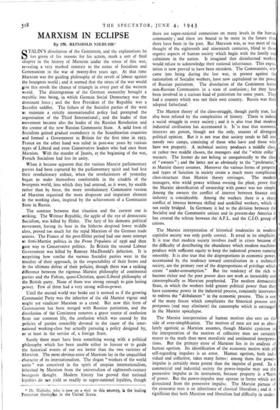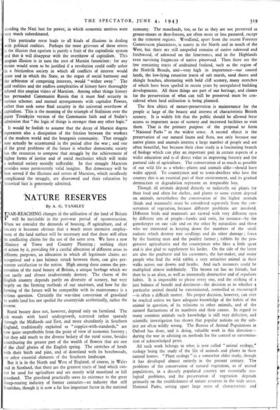MARXISM IN ECLIPSE
By DR. REINHOLD NIEBUHR*
STALIN'S dissolution of the Comintern, and the explanations he has given of his reasons for his action, mark a sort of final chapter in the history of Marxism under the stress of this war, revealing a very marked contrast to the status of Socialism and Communism in the war of twenty-five years ago. At that time Marxism was the .guiding philosophy of the revolt of labour against the bourgeois world ; and it seemed that the stress-of the war would give this revolt the chance of triumph in every part of the western world. The disintegration of the German monarchy brought a republic into being, in which German Social Democracy was the dominant force ; and the first President of the Republic was a Socialist saddler. The failure of the Socialist parties of the west to maintain a strictly internationalist policy had prompted the organisation of the Third International ; and the leader of that movement became also the leader of the Russian Revolution and the creator of the new Russian Communist State. A mild form of Socialism gained gradual ascendancy in the Scandinavian countries end formed a Government in Britain for the first time in 1923. France on the other hand was ruled in post-war years by various types of Liberal and even Conservative leaders who had once been Marxists. With the murder of Jaures, the beginning of the war, French Socialism had lost its unity.
When it became apparent that the various Marxist parliamentary parties had been captured by the parliamentary spirit and had lost their revolutionary ardour, when the revolutionists of yesterday began to make themselves comfortable in the citadels of the bourgeois world, into which they had entered, as it were, by stealth rather than by force, the more revolutionary Communist version of Marxism organised the more desperate and impatient element in the working class, inspired by the achievement of a Communist State in Russia.
The contrast between that situation and the current one is striking. The Weimar Republic, the apple of the eye of democratic Socialism, was killed by Hitler. The fury of his demonic political movement, having its base in the hitherto despised lower middle class, proved too much for the tepid Marxism of the German trade unions. The France of the post-Hitler period had one more attempt at semi-Marxist politics in the Front Populaire. of 1936 and then gave way to Conservative politics. In Britain the second Labour Government was killed by Ramsay MacDonald's defection. It is surprising how similar the various Socialist parties were in the timidity of their approach, in the respectability of their forms and in the ultimate defeat of their policies, though there was a striking difference between the rigorous Marxist philosophy of continental parties and the Fabian, quasi-Christian, quasi-Liberal philosophy of the British party. None of them was strong enough to gain lasting power. Few of them had a very strong will-to-power.
Until the second world war broke out it seemed as if the growing Communist Party was the inheritor of the old Marxist vigour and might yet vindicate Marxism as a creed. But now this form of Communism has been merged with Russian patriotism, and the dissolution of the Comintern removes a grave source of confusion from our common life, the confusion which was caused by the policies of parties ostensibly devoted to the cause of the inter- national working-class but actually. pursuing a policy designed by, or at least in the service of, a foreign State.
Surely there must have been something wrong with a political philosophy which has been unable either to foresee or to guide the historical events of our era better than the two varieties of Marxism. The most obvious error of Marxism lay in the unqualified - character of its internationalism. The slogan " workers of the world unite " was conceived in the spirit of utopian internationalism, inherited by Marxism from the universalism of eighteenth-century bourgeois thought. Modern history has proved that national loyalties do not yield so readily to super-national loyalties, though * Dr. Niebuhr, who is now on a visit to this country, Is the leading Protestant theologian in the United States. there are super-national connexions on many levels in the human community ; and there are bound to be more in the future than there have been in the past. But Marxism was, as was most of the thought of the eighteenth and nineteenth centuries, blind to those organic aspects of human society which begin with the family and culminate in the nation. It imagined that disinherited workers would refuse to acknowledge their national inheritance. This expec- tation is now proved to have been mistaken. The Communists, who came into being during the last war, in protest against the nationalism of Socialist workers, have now capitulated to the power of Russian patriotism. The dissolution of the Comintern leaves non-Russian Communists in a state of confusion ; for they have been involved in a curious kind of patriotism for some years. They had a country which was not their own country. Russia was their adopted fatherland.
The Marxist theory of the class-struggle, though partly true, has alsq been refuted by the complexities of history. There is indeed a social struggle in every society ; and it is also true that modern industrial civilisation has accentuated it. It is true that economic interests are potent, though not the only, sources of divergent political opinion. But it is not true that society tends to fall into merely two camps, consisting of those who have and those who have not property. A technical society produces a middle class, or rather two middle classes, the managers and the " white collar " workers. The former do not belong as unequivocally to the class of " owners " and the latter not as obviously to the "proletariat," as Marxist theory assumes. Moreover the various forms of property and types of function in society create a much more complicated class-structure than Marxist - theory envisages. The modern managers, who wield power without owning the plant, prove that the Marxist identification of ownership with power was too simple. Among the owners the conflict of interest between finance and industry is considerable. Among the workers there is a sharp conflict of interest between skilled and unskilled workers, which is not easily bridged. In Germany it led to the division between the Socialist and the Communist unions and in present-day America it has created the schism between the A.F.L. and the C.I.O. group of unions.
The Marxist interpretation of historical tendencies in modern capitalist society was only partly correct. It erred in its simplicity. It is true that modern society involves itself in crises because of the difficulty of distributing the abundance which modern machines produce with sufficient equity to keep the industrial process running smoothly. It is also true that the disproportions in economic power, accentuated by the tendency toward centralisation in a technical society, are the primary root of' the disproportions of privilege which create " under-consumption." But the tendency of the rich to become richer and the poor poorer does not work as inexorably and catastrophically as Marxism prophesied. The modern democratic State, in which the workers hold greater political power than they have economic power in the industrial process, constantly intervenes to redress the " disbalances " in the economic process. This is one of the many forces which complicates the historical process and postpones (and may eliminate) the catastrophe which is envisaged in the Marxist apocalypse.
The Marxist interpretation of human motives also errs on the side of over-simplification. The motives of men are not as abso- lutely egotistic as Marxism assumes, though Marxist cynicism in the interpretation of the Motives of collective man- are certainly nearer to the truth than most moralistic and sentimental interpreta- tions. But the primary error of Marxism lies in its analysis of human egotism. Its identification of the economic motive with all self-regarding impulses is an error. Human egotism, both indi- vidual and collective, takes many forms: among them the power- impulse is certainly more potent than the impulse of greed. In a commercial and industrial society the power-impulse may use the possessive impulse as its instrument, because property is aiform of power. But the power-impulse may operate in forms which are dissociated from the possessive impulse. The Marxist picture of the economic man is an inheritance of classical liberalism ; and it is significant that both Marxism and liberalism had difficulty in under- standing the Nazi lust for power, in which economic motives were very much subordinated, This particular error leads to all kinds of illusions in dealing with political realities. Perhaps the most grievous of these errors is the illusion that egotism is purely a fruit of the capitalistic system and that it will disappear with the overthrow of capitalism. This utopian illusion is in turn the root of Marxist fanaticism: for any means would seem to be justified if a revolution could really usher in a frictionless society in which all conflicts of interest would cease and in Which the State, as the organ of social harmony and the arbitrator of competing interests, would " wither away." The cold realities and the endless complexities of history have thoroughly refuted this utopian vision of Marxism. Among other things history has persuaded Communist Russia that it must find security in various schemer and mutual arrangements with capitalist Powers, rather than seek some final security in the universal overthrow of capitalism. This is the meaning of the triumph of Stalinism over the purer Trotzkyite version of the Communist faith and of Stalin's admission that " the logic of things is stronger than any other logic."
It would be foolish to assume that the decay of Marxist dogma represents also a dissipation of the friction between the workers of the modem world and the bourgeois community. That struggle may actually be accentuated in the period after the war ; and one of the great problems of the future is whether democratic society has the resources to compose that struggle by the achievement of higher forms of justice and of social mechanics which will make a technical society morally sufferable. In that struggle Marxism provides some permanently valid insights. But democracy will be best served if the illusions and errors of Marxism, which needlessly complicated the struggle, are disavowed and their refutation by historical fact is generously admitted.



























 Previous page
Previous page